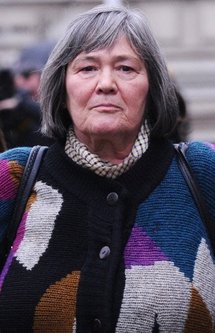
Clare Short
The outspoken former international development minister branded as nonsense Blair's claim -- repeated to the inquiry last week -- that the need to take action against Saddam increased as a result of the September 11, 2001 attacks.
"Tony Blair's account of the need to act urgently somehow because of September 11 doesn't stack up to any scrutiny whatsoever," she said.
Short, who was applauded by the audience after her testimony, said there was no evidence that Saddam was linked to Al-Qaeda -- and the Americans had been "misled" over the claim.
"There is no doubt that by invading in this ill-prepared, rushed way, not only did we cause enormous suffering and loss of life, we made Iraq more dangerous and unstable and spread Al-Qaeda's presence in the Middle East," she said.
Short poured scorn on the British government's pre-war claims that Saddam was developing weapons of mass destruction, saying he "didn't have the means" to develop a nuclear threat.
She said that while it was believed Iraqi scientists were working in chemical and biological laboratories, there were doubts over whether they could have "weaponised" the substances.
Short also said Blair's cabinet, of which she was part, was "misled" by the government's chief legal advisor Peter Goldsmith into thinking the war would not contravene international law.
"I think he misled the cabinet. He certainly misled me, but people let it through," she said.
Although she opposed the invasion, Short did not resign from the government until two months afterwards, in May 2003.
She has previously said Blair dissuaded her from quitting when the war started by promising her that her department would play a leading role in Iraq's reconstruction.
Although the planning for post-conflict Iraq avoided a "humanitarian catastrophe", the conflict had dire consequences, she said.
"I am saying we could have gone more slowly and carefully and not had a totally destabilised and angry Iraq into which came Al-Qaeda that wasn't there before, and that would have been safer for the world," Short said.
"What we did in Iraq was very dangerous, ill-considered and has made Iraq more dangerous and has destroyed lots of property and destroyed lots of people's lives," she said.
She suggested that the military option could have been avoided.
Saudi Arabia and Jordan had been discussing offering the Iraqi president exile and he "wasn't popular in his country", Short told her panel of questioners.
"I would have liked Saddam Hussein to be sent to the international court for crimes against humanity and crimes against peace," she said.
Blair's former spokesman, Alastair Campbell, has told the inquiry that Short was "difficult to handle" in the build-up to the war and the prime minister's inner circle feared she might leak information to the media.
Short said she had the impression she was being frozen out of meetings on Iraq from mid-2002.
The only other witness who has been applauded after their evidence is Elizabeth Wilmshurst, a former senior Foreign Office legal advisor who quit in protest at the war.
----------------------------------------------------------------------------------------
"Tony Blair's account of the need to act urgently somehow because of September 11 doesn't stack up to any scrutiny whatsoever," she said.
Short, who was applauded by the audience after her testimony, said there was no evidence that Saddam was linked to Al-Qaeda -- and the Americans had been "misled" over the claim.
"There is no doubt that by invading in this ill-prepared, rushed way, not only did we cause enormous suffering and loss of life, we made Iraq more dangerous and unstable and spread Al-Qaeda's presence in the Middle East," she said.
Short poured scorn on the British government's pre-war claims that Saddam was developing weapons of mass destruction, saying he "didn't have the means" to develop a nuclear threat.
She said that while it was believed Iraqi scientists were working in chemical and biological laboratories, there were doubts over whether they could have "weaponised" the substances.
Short also said Blair's cabinet, of which she was part, was "misled" by the government's chief legal advisor Peter Goldsmith into thinking the war would not contravene international law.
"I think he misled the cabinet. He certainly misled me, but people let it through," she said.
Although she opposed the invasion, Short did not resign from the government until two months afterwards, in May 2003.
She has previously said Blair dissuaded her from quitting when the war started by promising her that her department would play a leading role in Iraq's reconstruction.
Although the planning for post-conflict Iraq avoided a "humanitarian catastrophe", the conflict had dire consequences, she said.
"I am saying we could have gone more slowly and carefully and not had a totally destabilised and angry Iraq into which came Al-Qaeda that wasn't there before, and that would have been safer for the world," Short said.
"What we did in Iraq was very dangerous, ill-considered and has made Iraq more dangerous and has destroyed lots of property and destroyed lots of people's lives," she said.
She suggested that the military option could have been avoided.
Saudi Arabia and Jordan had been discussing offering the Iraqi president exile and he "wasn't popular in his country", Short told her panel of questioners.
"I would have liked Saddam Hussein to be sent to the international court for crimes against humanity and crimes against peace," she said.
Blair's former spokesman, Alastair Campbell, has told the inquiry that Short was "difficult to handle" in the build-up to the war and the prime minister's inner circle feared she might leak information to the media.
Short said she had the impression she was being frozen out of meetings on Iraq from mid-2002.
The only other witness who has been applauded after their evidence is Elizabeth Wilmshurst, a former senior Foreign Office legal advisor who quit in protest at the war.
----------------------------------------------------------------------------------------









 Home
Home Politics
Politics









